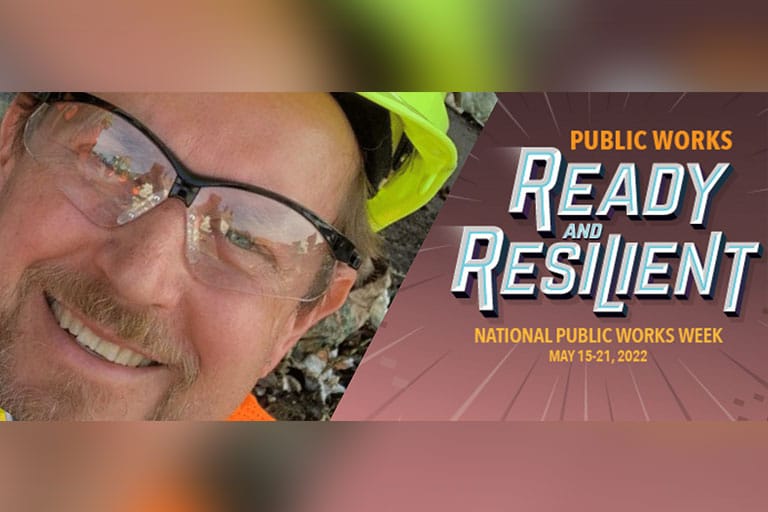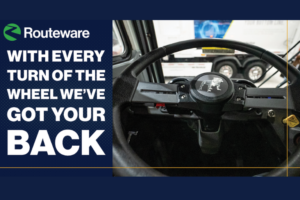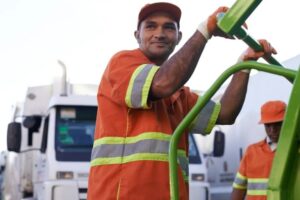It’s American Public Works Week, and we’re celebrating public works leaders in solid waste on our blog. Check back for a new profile feature each day!
From managing a recycling program for about 45,000 households and fielding phone calls, to organizing and overseeing special drop-off events and meeting with four city councils, Brooklyn Park, MN, Recycling Manager Tim Pratt’s work is never done.
“It keeps me out of trouble,” he quips.
As a leader in public works, Pratt exemplifies the qualities of readiness and resilience that the American Public Works Association celebrates this week — May 15-21. He holds a bachelor’s and master’s degree in broadcast journalism, and he spent 10 years in the field before transitioning into communications and recycling coordination for the City of Roseville, MN. There, he won an Emmy for the video “Boxes, Bottles, & Banana Peels: A Guide to School Recycling.”
Pratt then ran his own environmental communications consulting firm for several years before joining the team in Brooklyn Park in July 2015.
Throughout his career, Pratt has honed the skills and gained the experience he needs to expertly navigate busy days, myriad tasks and the ever-changing needs of a diverse, growing community.
Though Pratt has a liberal arts background, he comes from a family of scientists. His father was a botany professor and his family had a hobby farm, “so I grew up kind of in an environmental family,” he says.
“I saw these natural processes of things changing into other things,” from manure plowed into fields to become fertilizer and beyond. But when it came to recycling, he says, “I didn’t know really much of anything about it other than I recycled. … I had to learn a lot.”
He also had much to learn about the ever-changing population in Brooklyn Park, which is a “tremendously, wonderful diverse city,” Pratt says. There, some 20% of people were born in another country, and some 25% of people speak a language other than English at home, he says.
Pratt realized that to successfully serve the community, he needed to shift his way of thinking because everything he may assume about recycling and how to recycle are not necessarily the assumptions everyone makes. At the same time, his background in journalism and adapting communications to reach people from all walks of life helped to position him for the work.
“I have a unique skill set in this industry,” Pratt says. “I’m uniquely skilled at knowing how to talk trash.”
Getting out into the community
To better reach the people he serves, he knew he had to get out into the community, meet people and talk with them about their needs. To do so, he tapped into his curious nature, passion for helping others, and his desire to simply figure things out — all traits and skills that served him well during his days as a journalist.
Pratt uses a great analogy to describe how to successfully communicate with others. When you’re in school and conveying your ideas in the classroom, you do so through research and citations. But in the real world, if you offer citations during conversations, people will “look at you funny.”
Instead, you have to figure out how to put what you’re saying “into terms that people can relate to,” he says.
A task that becomes increasingly difficult when the people you serve speak a variety of languages.
Drawing on census data, Pratt and his team gained insight into who their customers are and the languages they speak. To align with that information, the city designed recycling education materials to include English, Spanish, Vietnamese and Hmong, and used images to better convey information, too.
Pratt spoke with the Multicultural Advisory Committee in Brooklyn Park and the nearby Brooklyn Center, and after some tweaks, they signed off on the materials.
Pratt also relies on language-inclusive digital tools for recycling, powered by ReCollect, to convey information to the community. The tools are created in English, and an automated process translates any given city or organization’s recycling and solid waste information into 15 languages, including Spanish, German and more.
For other outreach efforts, Pratt says he and his team found common ground with the community: jobs. He found that economic activity, jobs related to solid waste and recycling, as well as items that are commonly made from recycled materials “are things that kind of cross that boundary (and) resonate with folks,” he says.
From tech to Tik-Tok: Staying ahead of the curve
But the evolution of communications and strategies to reach everyone in the community didn’t stop there. It’s also imperative that his work incorporates of-the-moment changes in recycling, such as the boom in online ordering, and the resulting onslaught of cardboard boxes, during the COVID-19 pandemic.
“It’s kind of like thinking of yourself as a lifelong learner,” Pratt says. “Just because you got your degree and you’re now out in the working world, you don’t stop reading; you don’t stop learning; you don’t stop seeing new things and new possibilities,” he says. “You gotta keep yourself open to that and to be able to pivot.”
Another skillset he perfected during his time in journalism, which has become increasingly important while dealing with another ever-changing factor: technology.
“The challenge to me with technology is figuring out where people are and then figuring out how to use that technology to meet people where they’re at,” Pratt says. Lately, the popular app has been TikTok, a short video-focused social media platform.
One of Pratt’s favorite accounts to follow on the app is Jonathan Graziano and his senior pug, Noodle. If Noodle stands in Jonathan’s videos, it’s a “bones day,” Pratt says, which means Noodle is ready to seize the day. If Noodle lays or sits, Pratt says, it’s a “no bones day,” and it’s time for self-care.
“It’s absolutely heartwarming and hysterical,” he says.
Pratt’s willingness to adapt, drive to help others and passion for learning has served him and his community well in the past, and they will only continue in the future, ensuring many “bones days” to come.
To the future and beyond
Pratt says a county-wide initiative is now focusing on organics recycling, so Brooklyn Park has been rolling out programs to offer curbside collection.
Pratt is also working on an organics drop-off site, which he is eager to get up and running.
“You get drawn to government work because you want to help people,” he says. “I like the challenge and I like, at the end, being able to give some useful information to somebody that they can use to make their life better.”
Learn more. If you’re a solid waste leader looking to up your organization’s readiness and resilience, our best-in-class technology solutions can help. Let’s talk!





